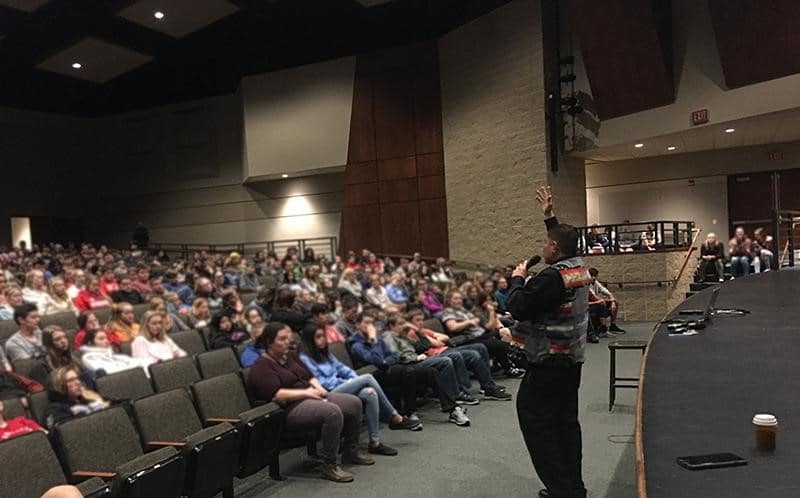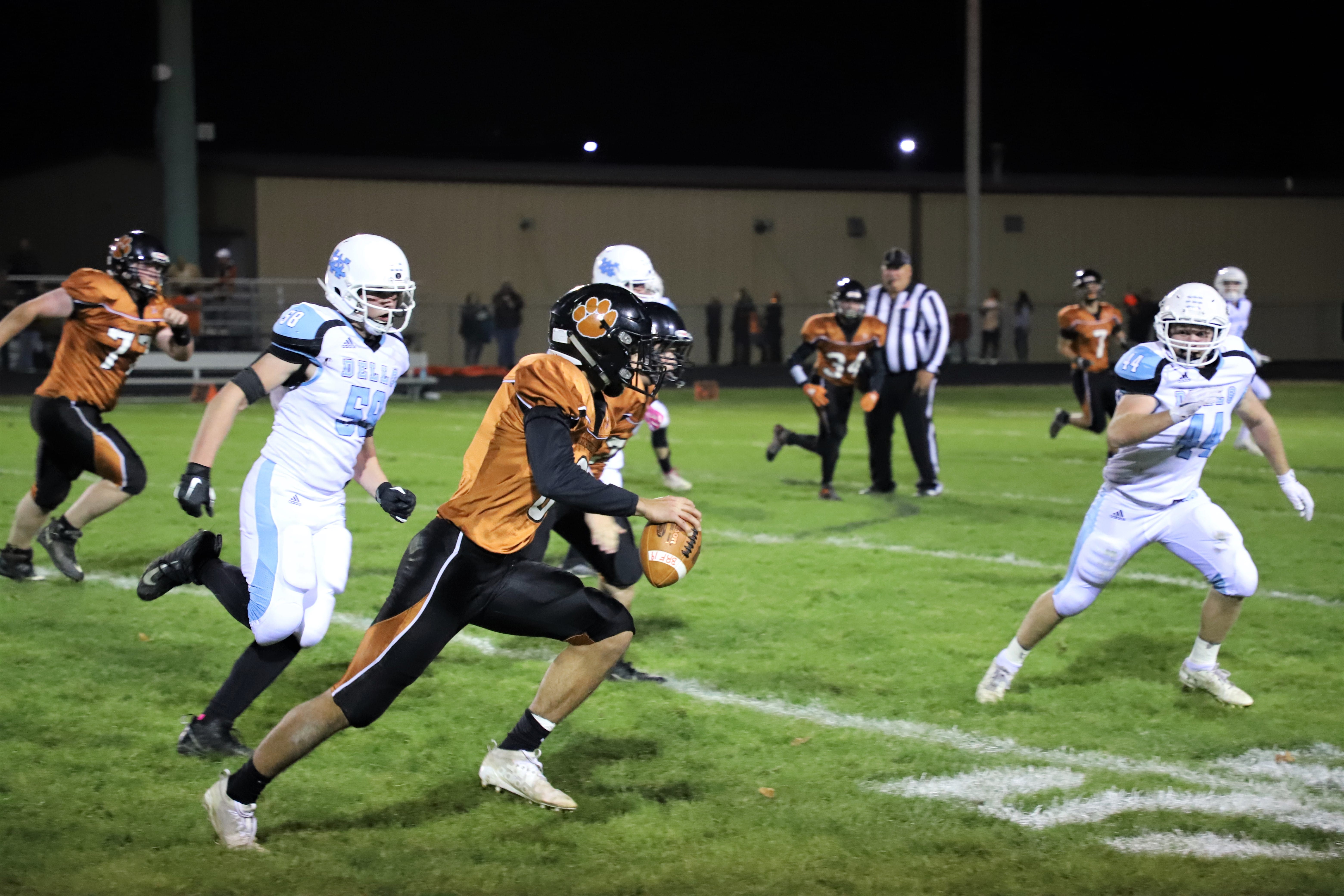CLINTONVILLE, WI The Wisconsin Indian Education Association and its board of directors have been monitoring the events surrounding a video originating from Clintonville High School in Clintonville, WI. The video, depicting what appeared to be four boys mock dancing to pre-recorded Native American pow-wow singing and drumming in the middle of a gymnasium, began circulating on social media on Thursday, October 3rd. Existence of the video and unfolding situation was brought to the attention of board president Brian Jackson that same day. On Friday, October 4th Jackson, along with others within the Association, began placing calls to the school seeking clarification to what many perceived as a disrespectful and culturally insensitive display. While those calls and subsequent voice messages went unanswered and unreturned, Jackson and colleagues remained engaged with individuals close to the situation.
After a lengthy investigation, which included a face-to-face
meeting with Clintonville High School Administration, the Wisconsin Indian
Education Association found the incident to have been a series of unfortunate
and highly troubling events that highlight the need for increased cultural
competence, diversity and inclusion within education at Clintonville and public
schools across Wisconsin.
What began as a festive homecoming week for students at
Clintonville High, ended in school-wide disappointment and calls for answers
from members of neighboring tribal nations. The 44 second video of the four
boys mock dancing to pre-recorded Native American singing and drumming began
circulating on social media Thursday, October 3rd and went viral the following
day. The boys, participating in a “Dance-Off” event, which was scheduled as one
in a series of Homecoming Week activities that day, acted spontaneously and
didn’t intended the skit to be malicious, according to Clintonville High School
Principal Kelly Zeinert. Yet the explanation demonstrated the need for
increased diversity and cultural competence within the school.
Administration says the dance skit was not authorized,
approved or organized by staff or employees of the district.
“Our initial thoughts were this incident was not acceptable
and we need to explain to our students why it wasn’t acceptable or culturally
appropriate,” said Clintonville Superintendent David Dyb. “We need to review
how we educate our students on being culturally aware in a global society,”
added Dyb.
The mock tribal dance drew a backlash of responses from
Native people across Wisconsin and news of the video made its way to the board
of directors of the National Indian Education Association (NIEA)—which were
holding the organization’s 50th annual convention the following week in
Minneapolis.
Wisconsin Indian Education Association (WIEA) president
Brian Jackson, who also serves on the board of directors for NIEA, traveled
last Monday, Oct 21st to Clintonville to meet with Clintonville High School
administration and student body to discuss the incident and encourage dialogue
between the school and Wisconsin’s Native community.
Clintonville is geographically located in the center of four
federally recognized tribal nations: The Ho-Chunk Nation, Menominee Indian
Tribe, Oneida Nation and Stockbridge-Munsee Band of Mohican Community.
“The Wisconsin Indian Education Association takes seriously
incidents that interfere or which have the potential to interfere with the
education and/or well-being of Native American students,” said Jackson of the
video. “So many people— Native people—were upset by the actions of the students
in the video. I felt it was important to hear from Clintonville administration
first-hand what happened,” continued Jackson.
The backlash was evident both online on social media and in
real-world responses.
“When Kelly arrived at work on October 4th, she had 80-plus
phone calls on her voicemail,” said Dyb of the Clintonville High principal’s
messages. “The phone calls were then redirected to the district office and
another 100-plus calls were received over the course of Friday through the
following Monday,” recounted Dyb.
Tribal officials weighed in on the issue, releasing
statements condemning the actions in the video.
Among the tribes commenting officially on the video were the
Oneida, Menominee and Ho-Chunk.
In attendance at the Monday, October 21st meeting were Brian
Jackson, WIEA President; Brandon Thoms, Public Relations and Communications
Specialist and consultant to WIEA; Kelly Zeinert, Principal and Kimberly
Bakeberg, Associate Principal, Clintonville High School. Dyb met with the WIEA
representatives later that day.
Zeinert explained to Jackson that there was much more than
meets the eye when it comes to the video. To many, what was shown on the video
equated to cultural insensitivity and appropriation however, the untold story
is just as complex as the issue itself. After investigating the incident, it
came to light that one of the boys in the video plays hockey for the Shawano
hockey team. The student told Zeinert that before practice and before some
games, the team had listened to Native American pow-wow songs as part of their
preparation to get them “pumped up.” It was shared that there are Native
American players on the Shawano hockey team—teammates to one of the boys seen
dancing to the pow-wow song in the video. According to Zeinert, it was that
boy’s idea for the impromptu dance reenactment with the other boys following
along. Zeinert said that there were multiple activities taking place throughout
the school that day and that the “Dance Off” was just one of several events
happening at the same time.
“The boys didn’t realize that what they were doing was
inappropriate,” said Zeinert. “We talked with the boys extensively and they
feel terrible. They were very remorseful. They now understand why what they did
was so upsetting to others.”
Dyb expounded on the implications of the boy’s actions.
“Some of our Native students were offended by the dance,”
said Dyb. “Likewise, many of our non-Native students were hurt that they were
‘lumped’ in with the boys that performed the dance—they felt like everyone in
the school was being considered a racist,” added Dyb.
As a result of the video going viral and in response to the
public backlash, it was announced at a school assembly Friday, October 4th that
the homecoming game was cancelled not out of contrition but to avoid further
controversy with the potential for protesters “who feel … that the students
here at Clintonville High School are racist, and, in turn, me as well, because
I allowed that to happen. Or so they think,” said Zeinert to Madison 365.
“Every student and person affected by this situation has the
right to feel the way they do about it,” said Jackson. “This demonstrates the
importance of Act 31 and serves as a reminder that we all have a responsibility
in educating our children to people of other races, ethnicities and cultures.
It’s a challenging situation all the way around.”
As part of the Monday, October 23rd all-school assembly, a
10-minute clip of the 1995 PBS documentary Lighting the 7th Fire, an in-depth
documentary on the Ojibwe treaty rights struggle of the 1980s and 90s. The film
was shown to give context to the purpose of Act 31. Jackson and Thoms spoke of
the 12 tribal nations in Wisconsin and the significance of each tribe’s
language and culture. At the conclusion of the assembly, Jackson explained the
significance of smudging with burning sage, while Thoms offered the traditional
practice to students and staff—many of which participated.
To address the need for increased cultural competence,
Clintonville High is working with individual tribal members, tribal
administrators, WIEA and has planned a series of engagement sessions with
Native American presenters and teachers.
Dyb says that the school is committed to healing and moving
forward and has already begun that process.
“Dave Raasch, and elder of the Stockbridge-Munsee Tribe,
came into the school on October 11th to do a restorative healing circle with
the students who were involved and our Native American students who were
willing to participate,” said Dyb. “Dave taught about the significance of the
circle and shared pieces of the culture. He encouraged us to ask people when we
have questions, rather than making assumptions,” added Dyb.
Raasch returned to the school on October 23rd to hold a
restorative healing circle with Clintonville staff.
On Monday, October 28th, well-known
Menominee/Stockbridge-Munsee musician, artist and historian Richie Plass
brought his traveling exhibit titled “Bittersweet Winds” to Clintonville High.
The exhibit showcases Native culture and heritage through traditional Native
arts and crafts, writing and poetry, historical news articles and photographic
images. The “Bittersweet Winds” exhibit was at Clintonville High through
October 30 and was open to the public on October 28 and 29.
Plass said he wasn’t surprised when news of the video of the
mock tribal dance broke.
“When I heard about it, I called Wendall Waukau at the
Menominee School District and talked about getting the exhibit down here,” said
Plass. “I’ve been around this so long that I knew I didn’t want to make any
assumptions as to what happened,” continued Plass in reference to the video.
In bringing his exhibit to the school, Plass said he hopes
that, “students and staff ask questions—so they’re actually made aware of the
disparities (among Native Americans)—and understand why a lot of us (Native
Americans) don’t agree or support what’s going on with the names (Indian team
names) and images (Indian mascots and logos).”
I think that’s a major part of the exhibit. Hopefully they
think differently when they see stuff like that happening (authentic pow-wow
dances),” added Plass.
Dyb said that he and his administration are reviewing the
current K-12 curriculum to make sure they are meeting the guidelines of Act 31.
In addition, he says the school’s annual Diversity Day, which is scheduled to
be held March 12, 2020, will focus on cultural awareness and sensitivity
training.
WIEA’s Jackson encouraged the administration to strengthen
the school’s engagement with neighboring tribes, reminding them that tribes
have many resources and are willing to share.
“As an association, one of WIEA’s missions is to ensure
Native students are afforded the same considerations that students from any
other group would expect. That includes proper representation, protection and
advocacy,” said Jackson. “By implementing Act 31 into the curriculum, schools
can help to curb such incidents and ultimately, promote inclusion and understanding
of just who we are as a people,” added Jackson.
As for Clintonville, the high school plans on taking steps
to educate and inform their students about cultural awareness, differences
among those cultures and acceptable practices relative to other cultures.
“We are taking this as an opportunity to learn and will
continue to improve cultural sensitivity and awareness,” said Dyb.
The school plans to reschedule the canceled homecoming dance
for a future date.
This article was
previously published in the Hocak Worak





